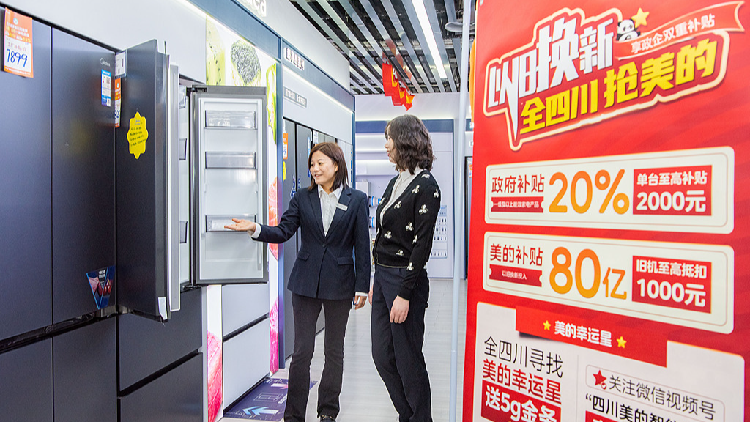China's large-scale trade-in program ignites market enthusiasm


<img src='https://news.cgtn.com/news/2024-11-03/China-s-large-scale-trade-in-program-ignites-market-enthusiasm-1yekcADyGyY/img/cdefe311db17440aba41591dfddcaf11/cdefe311db17440aba41591dfddcaf11.png' alt='A salesperson explains the features of refrigerators and government subsidy policies to a consumer, Guang'an City, southwest China's Sichuan Province, October 17, 2024. /CFP'
Across China, consumers eyeing new furniture, household appliances, or vehicles are flocking to take advantage of substantial discounts and government subsidies, whether shopping online or in stores.
This year, China launched a new wave of large-scale trade-ins focusing on equipment renewals and upgrades, as well as consumer products, in hopes of stimulating domestic consumption and boosting the development of multiple industries.
Data disclosed by the Ministry of Commerce shows the program has noticeably boosted market confidence, especially in the automotive sector.
In September, domestic passenger vehicle retail sales reached 2.112 million units, up 4.5 percent year on year. In the first three weeks of October, sales rose by 16 percent compared to the previous year and by 12 percent over September, according to Li Gang, director general of the Department of Market Operation and Consumption Promotion of the Commerce Ministry, at a news briefing on October 25.
He added that more than 2.83 million vehicle upgrade subsidy applications had been submitted nationwide by October 24, with demand still climbing.
The policy has also revitalized the home appliance market. By October 25, 14.203 million consumers had purchased 20.726 million units across the eight eligible appliance types, contributing to a sales revenue of 95.07 billion yuan. For home renovations, consumers bought approximately 6.3 million subsidy-eligible products, generating an additional 19 billion yuan in sales revenue.
The national trade-in program was first introduced in February and the State Council then made arrangements for its implementation in March. Three months later, the National Development and Reform Commission (NDRC) and the Finance Ministry announced to utilize around 300 billion yuan ($42.5 billion) worth of ultra-long-term special government bond funds this year to support the trade-in program. After that, the project was soon expanded from industrial equipment to areas such as home appliances, vehicles and even real estate.
<img src='https://news.cgtn.com/news/2024-11-03/China-s-large-scale-trade-in-program-ignites-market-enthusiasm-1yekcADyGyY/img/96fb63b09f8647c3af3be1f11e7b435e/96fb63b09f8647c3af3be1f11e7b435e.png' alt='A consumer is test-driving a car at an auto show, with a promotional sign on top of the car displaying "20,000 yuan off," Jinhua City, east China's Zhejiang Province, October 19, 2024. /CFP'
Under this policy, eligible individuals can receive a subsidy of 20,000 yuan for purchasing new energy vehicles and 15,000 yuan for buying fuel-powered passenger cars. Dealerships, banks and insurance companies are encouraged to give additional discounts to car buyers.
Households can enjoy a subsidy of up to 20 percent on eight types of home appliances: refrigerators, washing machines, televisions, air conditioners, computers, water heaters, household stoves, and range hoods that meet energy or water efficiency standards of level 1 or higher. Furthermore, home renovations are eligible for a subsidy covering 15 percent of the renovation costs.
Zhang Yijun, a resident of south China’s Guangdong Province, recently replaced his air conditioner, which had been running for over 10 years, with an energy-efficient new one. “Not only did I receive a subsidy, but I’m also saving significantly on my monthly electricity bills,” Zhang shared with CMG.
Encouraged by the policy, Wu Qiang, a resident of east China’s Jiangsu Province, recently traded his 16-year-old fuel-powered vehicle for a new Mercedes-Benz Smart electric car, receiving a 20,000-yuan subsidy through the program.
This policy not only boosts consumer spending but also accelerates the transformation of industries toward greener, smarter technologies, benefiting the environment, advancing industry standards, and enhancing people’s quality of life, said Zhang Wei, vice president of the Chinese Academy of International Trade and Economic Cooperation under the Ministry of Commerce.

